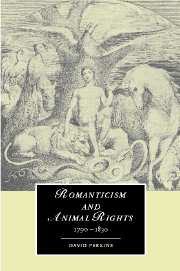Book contents
- Frontmatter
- Contents
- Preface
- Acknowledgments
- 1 In the beginning of animal rights
- 2 Grounds of argument
- 3 Keeping pets: William Cowper and his hares
- 4 Barbarian pleasures: against hunting
- 5 Savage amusements of the poor: John Clare's badger sonnets
- 6 Work animals, slaves, servants: Coleridge's young ass
- 7 The slaughterhouse and the kitchen: Charles Lamb's “Dissertation upon Roast Pig”
- 8 Caged birds and wild
- Notes
- Bibliographical essay
- Index
- CAMBRIDGE STUDIES IN ROMANTICISM
4 - Barbarian pleasures: against hunting
Published online by Cambridge University Press: 22 September 2009
- Frontmatter
- Contents
- Preface
- Acknowledgments
- 1 In the beginning of animal rights
- 2 Grounds of argument
- 3 Keeping pets: William Cowper and his hares
- 4 Barbarian pleasures: against hunting
- 5 Savage amusements of the poor: John Clare's badger sonnets
- 6 Work animals, slaves, servants: Coleridge's young ass
- 7 The slaughterhouse and the kitchen: Charles Lamb's “Dissertation upon Roast Pig”
- 8 Caged birds and wild
- Notes
- Bibliographical essay
- Index
- CAMBRIDGE STUDIES IN ROMANTICISM
Summary
It was in the eighteenth century that “field sports” first encountered the strong ideological antagonism that has dogged them, so to speak, ever since. By 1838 William Howitt, surveying The Rural Life of England, could write that the “charge of cruelty” is “perpetually directed” against hunters. I do not suggest that the attacks on hunting were similar in content to those now, though much that was written then is still relevant and moving. The polemic was different because so also were the cultural contexts, social meanings, participants, and technologies of hunting.
To take game was then an exclusive privilege of the gentry. What was considered to be game varied with time and place, but deer, grouse, and pheasants were on the list and so usually were foxes by the early nineteenth century. Game could be hunted only by persons who owned land worth at least £100 a year and others of equivalent social standing. The rest of mankind could not take game legally even on their own land, if they had any, and even if the animals were destroying their crops. No one was allowed to market it. At a hundred or two hundred guineas, hunting horses cost about four times more than ordinary ones. According to John Lawrence, in 1829 it cost about £60 a year to keep a hunting horse.
- Type
- Chapter
- Information
- Romanticism and Animal Rights , pp. 64 - 88Publisher: Cambridge University PressPrint publication year: 2003

